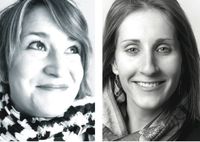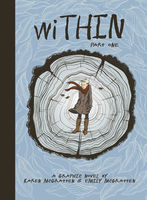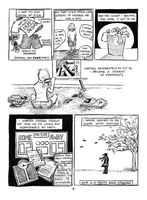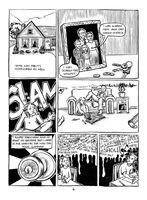Guttersnipes: Emily and Karen Mcgratten
By Evan Munday
TCAF is the Toronto Comic Arts Festival. It is an annual week-long celebration of comics and graphic novels and their creators, featuring readings, interviews, panels, workshops, gallery shows, art installations, and culminating in a two-day exhibition and vendor fair featuring hundreds of comics creators from around the world. The Toronto Comic Arts Festival 2014 will take place Saturday, May 10 and Sunday May 11, at Toronto Reference Library (789 Yonge Street). Admission is free. Leading up to the Festival, I'll be interviewing some of the dazzling comic writers and illustrators – particularly the Canadian ones – who have brand-new books out for TCAF.
Karen McGratten is an Ontario-based psychotherapist, with her main clinical focus being the treatment of eating disorders. So, when, she decided to mine her own struggles with anorexia, she enlisted the aid of her illustrator sister-in-law, Emily McGratten. Emily is a comic artist and printmaker living in Kelowna. Together, they developed wiTHIN, a new graphic novel that offers a glimpse into the life of a young Karen as she struggles to find herself while dealing with bullying, family, spirituality, and learning to live with a mental illness.
What was your favourite comic book when you were thirteen?
EMILY: I never really was into comics much as a kid, unless you count Calvin and Hobbes. I only really started getting into reading graphic novels after I was introduced to them while studying English at University. I read Maus by Art Spiegelman and was completely hooked!
KAREN: I am the sister of an avid comic collector. His passion inevitably seeped into my life so I was aware of the comic scene but never read them myself. Like Emily, I started reading graphic novels later in life after being introduced to them with the book Blankets.
What was the name and general premise of the first book you ever made? (That is, when you were a kid, making stories for your siblings and/or friends?)
EMILY: I wrote so many stories as a kid. They were all these super-intricate illustrated adventure stories about my friends and me as we went on fantastic journeys. Usually it involved someone's parents dying, dragons or some kind of monster, and a magic sword. I read a lot as a kid and was really into fantasy stories, so the books I made were always pretty similar to those, but I included way more pull-out treasure maps.
Have you been to TCAF before? If so, what’s your favourite TCAF memory? If not, what are you most looking forward to?
KAREN: I was really impressed with the fact that there was a great mixture of artists who are pretty well known with others who are just starting out. It made it more inviting for me to join in knowing that there are others there just starting out like myself.
EMILY: Sometimes it's easy to feel as though there aren't really many people out there interested in comics in my daily life, but an event like this reminds me that there is a huge interest and such a supportive community out there. It's a great venue to make connections with other like-minded folks. I'm really looking forward to seeing amazing new work by some really talented people.
Your CanLit News
Subscribe to Open Book’s newsletter to get local book events, literary content, writing tips, and more in your inbox
What do you find the most difficult thing to write? Draw?
KAREN: Writing about the more sensitive aspects of my recovery can be challenging, especially the parts that really show my vulnerability. For example, my family dynamics and seeing the full extent of how my eating disorder impacted them, and then writing about that can sometimes be difficult and stir up emotions.
EMILY: I think it really depends on the day. At this point, I don't generally have a hard time drawing something specific, but some days it can just be a challenge to get what's in my head out through my hands. Other days, it seems like I don't even need to think about what I'm doing, it just flows.
wiTHIN is a very personal story. When did you, Karen, decide to turn your struggle with anorexia into a comic book?
KAREN: I've always chosen to be open about my story and have attempted to write a book about it and my recovery as a way to make some meaning from my experience. But the idea for a graphic novel came into the picture about six years ago while hanging out with my brother and sister-in-law one day. People with mental health issues often struggle with concentration and retention, so we thought the use of images and minimal words would be beneficial for such an audience. Also, it gives family members and friends a real sense of emotion and the feeling of chaos that's within someone struggling with an eating disorder.
Have you heard from readers yet who have had their own battles or experiences with eating disorders? If so, what have they said?
EMILY: We're always hearing stories from people who learn about our book and its message – about either their own personal struggle with an eating disorder or that of someone close to them who can really relate to the message. It seems like almost everyone we talk to has their own story to tell about their encounters with issues of mental health. It has been a really great conversation starter in that way. It's been neat to see how quickly someone will open up and talk about their own story once they see there is a safe outlet for discussion.
KAREN: In Canada, 6% of women and 3% of men will experience an eating disorder in their lifetime and one in five Canadians will experience a mental health or addiction issue. These statistics show just how likely each of us know someone who has struggled with a mental health issue or has personally struggled themselves so we are always getting some kind of feedback from people who hear about our book.
Correct me if I’m wrong, but you're sisters. What is it like having your sibling illustrate what you went through? And what is it like being asked to illustrate your sister’s story?
EMILY: We're actually sisters-in-law. [I got corrected. – Evan] I'm married to Karen's brother, but I feel as though we are actual sisters. We're lucky to have such a great relationship. I've known Karen for the majority of her illness through to her recovery, so I know that there is a positive ending to it all. In that sense, it made some of the more challenging scenes a bit easier to get through. But every now and then it would hit me that this is Karen I'm drawing and I would have to set it aside for a bit and come back to it later when I could detach myself from the imagery a little.
KAREN: I appreciated the connection we have because I knew Emily would be able to draw my journey in a respectful way. It is an intimate journey and I wouldn't want just anyone to illustrate it. That said, it has been a unique experience having to be so transparent to Emily about aspects of my past that maybe she didn't know the extent of.
Visit torontocomics.com to find out more about TCAF and the McGrattens' appearance at the festival.
The views expressed in the Writer-in-Residence blogs are those held by the authors and do not necessarily reflect the views of Open Book: Toronto.
The views expressed in the Writer-in-Residence blogs are those held by the authors and do not necessarily reflect the views of Open Book.
Evan Munday is the author and illustrator of the acclaimed book series for young readers, The Dead Kid Detective Agency. Both The Dead Kid Detective Agencyand its sequel, Dial M for Morna, were nominated for the Silver Birch Fiction Award.
Evan has worked in book marketing and publicity for ten years, eight of which were as publicist at Coach House Books, and he has since worked as a freelance illustrator and ebook designer.
Find out more about Evan on his website, idontlikemundays.com or follow him on Twitter at @idontlikemunday.






